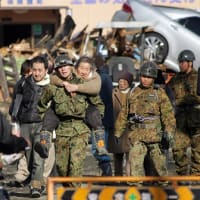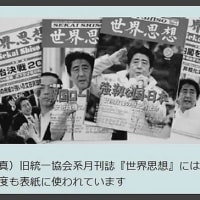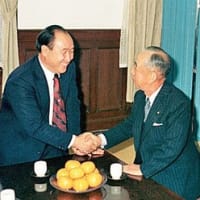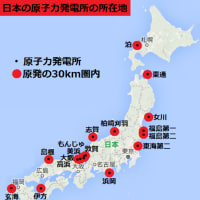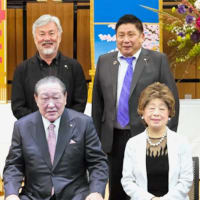Article 5
Ownership of Property
Iraq owns all the buildings and installations, the nontransferable
structures on the ground that are located in the areas and installations
agreed upon, including those the U.S. utilizes, constructs, changes or
improves.
At withdrawal, the U.S. will return all the installations and the agreed
upon areas allocated for the use of the U.S. combat forces according to two
lists (of inventory) to the Iraqi government. The first of these is to be
submitted covering the installations and agreed upon areas as soon as the
agreement is implemented. And the other list is to be submitted no later
than June 30, 2009, the appointed date for U.S. Forces withdrawal from
cities, towns and villages. And the Iraqi government has the right to
permit the U.S. Forces to use some necessary installations for this
agreement's purposes at withdrawal.
The U.S. bears all the costs of building, modification or renovation in the
installations and agreed upon areas allocated for their exclusive use. The
U.S. will consult with the Iraqi government as to building, modification or
renovation works and must seek the approval of the Iraqi government
regarding major modifications and construction projects. And in cases of
joint utilization of installations and agreed upon areas, both parties will
bear the cost of construction, modification or renovation according to the
percentage of use.
The U.S. will bear the cost of the services it requests and receives in the
installations and agreed upon areas for its exclusive use. And both parties
will bear the cost for requested and received services in the installations
and agreed upon areas and according to percentage of each party's use.
When a historical or cultural site is discovered, or a strategic resource
is found within the installations and agreed upon areas, all construction,
modification and innovation works are to stop immediately, and the Iraqi
representatives in the Committee are to be informed in order to determine
the appropriate steps in regard to it.
The U.S shall return the installations and agreed upon areas and any other
installations, or non-transportable structures that it erected, fixed or
used during the validity of this agreement according to mechanisms and
priorities defined by the Joint Committee; and these installations and
areas are to be returned to the Iraqi government free of debts and any
financial obligations.
The U.S. Forces shall return to the Iraqi government the installations and
agreed upon areas of traditional, moral and political importance and any
other fixed structures that the U.S. Forces may have built, assembled, or
installed according to mechanisms and priorities and a time period to be
agreed upon in the Joint Committee, and with no financial obligations.
The U.S. shall return the rest of the installations and agreed upon areas
to the Iraqi government when the validity of this agreement comes to an end
or when it is terminated, or at any time prior to that, agreed upon by the
two parties, or when the U.S. no longer needs the installations in
accordance to what the Committee decrees, without debt or financial
obligations.
The U.S. and the contractors with the U.S. retain the ownership of all the
equipment, materials, supplies, transportable installations and other
transportable property imported to Iraq or acquired in Iraq legitimately
and in connection to this agreement.
Article 6
Usage of the Installations and the Agreed Upon Areas
With full respect for the sovereignty of Iraq, in the framework of
exchanging points of view between the two parties regarding this agreement,
Iraq guarantees that the U.S. Forces and contractors with the U.S Forces
and the workers employed by these contractors and the personnel and other
entities can reach and use the installations and agreed upon areas
according to what both parties agree upon.
Iraq permits the U.S. Forces, according to this agreement, to exercise
inside the installations and agreed upon areas all rights and authorities
that may be necessary to build, use and secure these installations and
agreed upon areas. Both parties are to coordinate and cooperate as to how
these rights and authorities may be practiced in the installations and
agreed upon areas that are joint utilities.
The U.S Forces control the entrances to the installations and agreed upon
areas that are allocated for their exclusive use. Both parties are to
coordinate the control of the installations and agreed upon areas of joint
use, and according to mechanisms approved by the Joint Committee to
coordinate joint military operations. Both parties are to coordinate the
guard missions in the areas adjacent to the installations and the agreed
upon areas through the Joint Committee for coordination of military
operations.
Article 7
Installing and Storing Defense Equipment
U.S. Forces may install inside the installations and agreed upon areas and
in other temporary sites agreed upon by both parties, defense equipment and
supplies and materials the U.S. Forces need in connection to activities
agreed upon in this agreement. The U.S. is to use and store this equipment
in a manner appropriate to their temporary mission in Iraq and in
accordance with article four of this agreement, on condition that it has no
direct or indirect connection to weapons of mass destruction (chemical
weapons, nuclear weapons, radiological weapons, biological weapons and the
wastes related to such weapons). And the U. S. is to control the use and
transport of the defense equipment owned by it that is stored in Iraq. It
(the U.S.) is to guarantee that no explosives or ammunition are to be
stored in installations near residential areas, and that it is to move
materials stored in installations near residential areas. The U.S. is to
provide the Iraqi government with the necessary information regarding the
quantities and types of these stored materials.
Article 8
Environmental Protection
Both parties are to execute this agreement in a manner consistent with
protection of the natural environment, health and human security. And the
U.S. commits again to respecting the laws of the environment and Iraqi laws
in implementing its policies for the purposes of this agreement.
Article 9
Movement of Vehicles, Ships and Planes
With full respect for the rules of safety in land and marine movement,
vehicles and ships used by the U.S Force and those that are administered on
its account exclusively, may enter and depart and move within Iraqi
territory for the purposes of implementing this agreement. The Joint
Committee is to coordinate joint military operations and lay down the
appropriate rules and procedures to facilitate and regulate the movement of
vehicles.
With full respect for the related rules of safety in flight and aviation,
permission will be given for the aircraft of the U.S. government and the
civilian aircraft at the time to fly in the Iraqi airspace that are
operating in accordance with a contract with the Department of Defense of
the U.S. exclusively, and to re-fuel in the air exclusively for the
purposes of implementing this agreement; and to land and take off within
Iraqi territory for the purposes of implementing this agreement. Iraqi
authorities will annually issue a permit for the aforementioned aircraft to
land on Iraqi territory and take off from it for the exclusive purpose of
implementing this agreement. The aircraft, ships and vehicles of the U.S
government and the civilian aircraft exclusively working at the time in
accordance with a contract with the U.S. Department of Defense will not
permit any party aboard them without the consent of the U.S. Forces
authorities, and the related joint subcommittee is to agree upon the
appropriate procedures to facilitate regulating the traffic.
Iraqi airspace control and monitoring will be transferred to the Iraqi
authorities immediately as this agreement becomes valid.
The Iraqi government has the right to request the temporary support of the
U.S. Forces for the Iraqi authorities in controlling and monitoring Iraqi
airspace.
U.S. government aircraft and civilian aircraft at that time working in
accordance with a contract with the U.S. Department of Defense exclusively
are exempt from any taxes, or any similar charges including the flight,
aviation, landing or waiting at the airport charges by the Iraqi
government. And also exempt from any taxes, government collections or any
other charges are the vehicles owned by the U.S. Forces or are being used
exclusively by the U.S. Forces for the purposes of implementing this
agreement. And this includes the ports run by the Iraqi government, and
these vehicles, aircraft and ships are exempt from registration demands
inside Iraq.
U.S Forces are to pay for any services it requests and obtains.
Each of the two parties is to provide the other party with maps and other
available information regarding locations of mine fields and other
obstacles that may obstruct movement within the Iraqi land and waters or
endanger it.
Ownership of Property
Iraq owns all the buildings and installations, the nontransferable
structures on the ground that are located in the areas and installations
agreed upon, including those the U.S. utilizes, constructs, changes or
improves.
At withdrawal, the U.S. will return all the installations and the agreed
upon areas allocated for the use of the U.S. combat forces according to two
lists (of inventory) to the Iraqi government. The first of these is to be
submitted covering the installations and agreed upon areas as soon as the
agreement is implemented. And the other list is to be submitted no later
than June 30, 2009, the appointed date for U.S. Forces withdrawal from
cities, towns and villages. And the Iraqi government has the right to
permit the U.S. Forces to use some necessary installations for this
agreement's purposes at withdrawal.
The U.S. bears all the costs of building, modification or renovation in the
installations and agreed upon areas allocated for their exclusive use. The
U.S. will consult with the Iraqi government as to building, modification or
renovation works and must seek the approval of the Iraqi government
regarding major modifications and construction projects. And in cases of
joint utilization of installations and agreed upon areas, both parties will
bear the cost of construction, modification or renovation according to the
percentage of use.
The U.S. will bear the cost of the services it requests and receives in the
installations and agreed upon areas for its exclusive use. And both parties
will bear the cost for requested and received services in the installations
and agreed upon areas and according to percentage of each party's use.
When a historical or cultural site is discovered, or a strategic resource
is found within the installations and agreed upon areas, all construction,
modification and innovation works are to stop immediately, and the Iraqi
representatives in the Committee are to be informed in order to determine
the appropriate steps in regard to it.
The U.S shall return the installations and agreed upon areas and any other
installations, or non-transportable structures that it erected, fixed or
used during the validity of this agreement according to mechanisms and
priorities defined by the Joint Committee; and these installations and
areas are to be returned to the Iraqi government free of debts and any
financial obligations.
The U.S. Forces shall return to the Iraqi government the installations and
agreed upon areas of traditional, moral and political importance and any
other fixed structures that the U.S. Forces may have built, assembled, or
installed according to mechanisms and priorities and a time period to be
agreed upon in the Joint Committee, and with no financial obligations.
The U.S. shall return the rest of the installations and agreed upon areas
to the Iraqi government when the validity of this agreement comes to an end
or when it is terminated, or at any time prior to that, agreed upon by the
two parties, or when the U.S. no longer needs the installations in
accordance to what the Committee decrees, without debt or financial
obligations.
The U.S. and the contractors with the U.S. retain the ownership of all the
equipment, materials, supplies, transportable installations and other
transportable property imported to Iraq or acquired in Iraq legitimately
and in connection to this agreement.
Article 6
Usage of the Installations and the Agreed Upon Areas
With full respect for the sovereignty of Iraq, in the framework of
exchanging points of view between the two parties regarding this agreement,
Iraq guarantees that the U.S. Forces and contractors with the U.S Forces
and the workers employed by these contractors and the personnel and other
entities can reach and use the installations and agreed upon areas
according to what both parties agree upon.
Iraq permits the U.S. Forces, according to this agreement, to exercise
inside the installations and agreed upon areas all rights and authorities
that may be necessary to build, use and secure these installations and
agreed upon areas. Both parties are to coordinate and cooperate as to how
these rights and authorities may be practiced in the installations and
agreed upon areas that are joint utilities.
The U.S Forces control the entrances to the installations and agreed upon
areas that are allocated for their exclusive use. Both parties are to
coordinate the control of the installations and agreed upon areas of joint
use, and according to mechanisms approved by the Joint Committee to
coordinate joint military operations. Both parties are to coordinate the
guard missions in the areas adjacent to the installations and the agreed
upon areas through the Joint Committee for coordination of military
operations.
Article 7
Installing and Storing Defense Equipment
U.S. Forces may install inside the installations and agreed upon areas and
in other temporary sites agreed upon by both parties, defense equipment and
supplies and materials the U.S. Forces need in connection to activities
agreed upon in this agreement. The U.S. is to use and store this equipment
in a manner appropriate to their temporary mission in Iraq and in
accordance with article four of this agreement, on condition that it has no
direct or indirect connection to weapons of mass destruction (chemical
weapons, nuclear weapons, radiological weapons, biological weapons and the
wastes related to such weapons). And the U. S. is to control the use and
transport of the defense equipment owned by it that is stored in Iraq. It
(the U.S.) is to guarantee that no explosives or ammunition are to be
stored in installations near residential areas, and that it is to move
materials stored in installations near residential areas. The U.S. is to
provide the Iraqi government with the necessary information regarding the
quantities and types of these stored materials.
Article 8
Environmental Protection
Both parties are to execute this agreement in a manner consistent with
protection of the natural environment, health and human security. And the
U.S. commits again to respecting the laws of the environment and Iraqi laws
in implementing its policies for the purposes of this agreement.
Article 9
Movement of Vehicles, Ships and Planes
With full respect for the rules of safety in land and marine movement,
vehicles and ships used by the U.S Force and those that are administered on
its account exclusively, may enter and depart and move within Iraqi
territory for the purposes of implementing this agreement. The Joint
Committee is to coordinate joint military operations and lay down the
appropriate rules and procedures to facilitate and regulate the movement of
vehicles.
With full respect for the related rules of safety in flight and aviation,
permission will be given for the aircraft of the U.S. government and the
civilian aircraft at the time to fly in the Iraqi airspace that are
operating in accordance with a contract with the Department of Defense of
the U.S. exclusively, and to re-fuel in the air exclusively for the
purposes of implementing this agreement; and to land and take off within
Iraqi territory for the purposes of implementing this agreement. Iraqi
authorities will annually issue a permit for the aforementioned aircraft to
land on Iraqi territory and take off from it for the exclusive purpose of
implementing this agreement. The aircraft, ships and vehicles of the U.S
government and the civilian aircraft exclusively working at the time in
accordance with a contract with the U.S. Department of Defense will not
permit any party aboard them without the consent of the U.S. Forces
authorities, and the related joint subcommittee is to agree upon the
appropriate procedures to facilitate regulating the traffic.
Iraqi airspace control and monitoring will be transferred to the Iraqi
authorities immediately as this agreement becomes valid.
The Iraqi government has the right to request the temporary support of the
U.S. Forces for the Iraqi authorities in controlling and monitoring Iraqi
airspace.
U.S. government aircraft and civilian aircraft at that time working in
accordance with a contract with the U.S. Department of Defense exclusively
are exempt from any taxes, or any similar charges including the flight,
aviation, landing or waiting at the airport charges by the Iraqi
government. And also exempt from any taxes, government collections or any
other charges are the vehicles owned by the U.S. Forces or are being used
exclusively by the U.S. Forces for the purposes of implementing this
agreement. And this includes the ports run by the Iraqi government, and
these vehicles, aircraft and ships are exempt from registration demands
inside Iraq.
U.S Forces are to pay for any services it requests and obtains.
Each of the two parties is to provide the other party with maps and other
available information regarding locations of mine fields and other
obstacles that may obstruct movement within the Iraqi land and waters or
endanger it.











